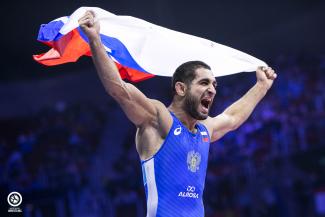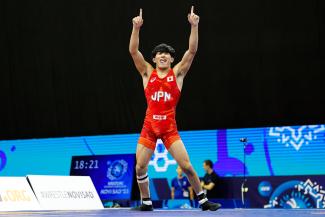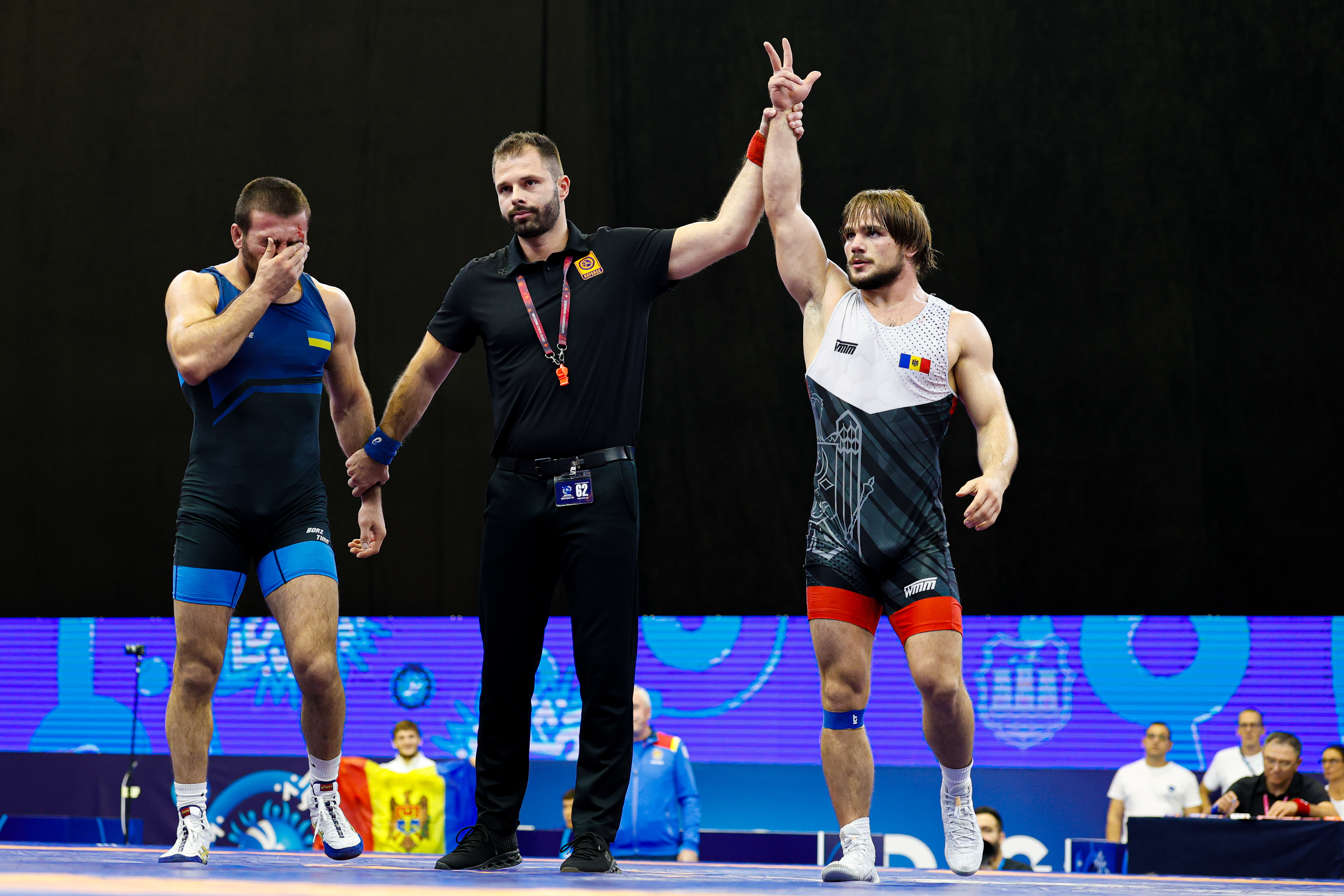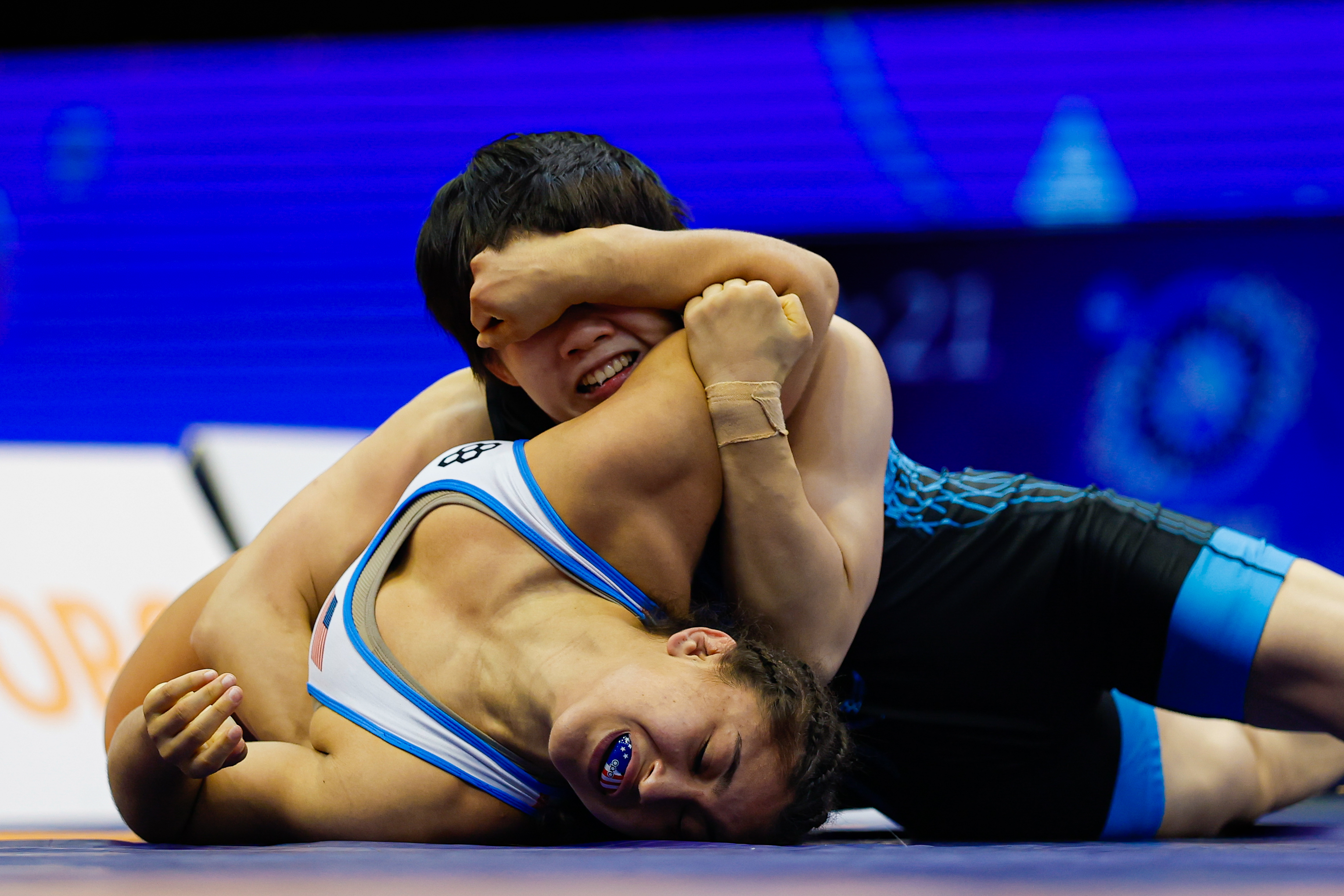Weekly FIVE! December 17, 2018
Monday, December 17, 2018 - 14:17 By Eric Olanowski

Reviewing the #UWWAwards and Rahimi's return. Also discussing United World Wrestling and USA Wrestling’s Wrestling4Peace initiative in Puerto Rico.
1. Deng and Olli Among History Makers of the Year Recipients
United World Wrestling has named China’s DENG Zhiwei, Finland’s Petra OLLI, and Russia’s Greco-Roman world team the History Makers of the Year award.
Deng Zhiwei captured a silver medal at the 2018 World Championships in Budapest, Hungary and became China’s first-ever freestyle world medalist.
In women’s wrestling, Petra OLLI (FIN) improved on her 2015 World Championships silver medal finish when she avenged her Poland Open finals loss and hung on to beat Canada’s Danielle LAPPAGE, 6-5. Olli’s final win at 65kg granted Finland their first-ever women’s wrestling gold medal and first world title since Marko YLI-HANNUKSELA (FIN) won Greco-Roman gold at the 1997 Wroclaw, Poland World Championships.
In Greco-Roman, Russia made history by winning six of ten possible gold medals. Russia’s 2018 Greco-Roman team outdid their fellow countrymen who set the gold medal record when they won five world titles in 1994. The six Russian wrestlers who won gold medals in Budapest were Sergey EMELIN (60kg), Stepan MARYANYAN (63kg), Artem SURKOV (67kg), Aleksandr CHEKHIRKIN (77kg), Musa EVLOEV (97kg), and Sergey SEMENOV (125kg).
2.Pataridze, Kawai Highlight End-of-the-Year Age-Group Awards
United World Wrestling has awarded a pair of cadet, junior and U23 wrestlers the 2018 Age-Group Wrestlers of the Year.
The U23 age-group wrestlers of the year went to the duo of Zviadi PATARIDZE (GEO) and Yukako KAWAI (JPN).
Pataridze won his sixth overall Greco-Roman age-group world title, scooping up the 2018 U23 world title at 130kg in Bucharest, Romania.
Kawai, the sister of the three-time world and Olympic champion, Risako KAWAI (JPN), won the 62kg gold medal at the U23 World Championships after falling in the finals of the Senior World Championships. Kawai’s gold and silver medal performances at the World Championships are improvements from a season ago when she took eighth-place at the Senior World Championships and ninth-place at the Junior World Championships.
The Russian twosome of Aleksander KOMAROV (RUS) and Khanum VELIEVA (RUS) earned the junior age-group wrestlers of the year after obtaining gold medals in Trnava, Slovakia at the 2018 Junior World Championships.
Komarov, one of the most dominant Greco-Roman age-group wrestlers in the world, remained undefeated in his international career and won his second junior world title. Komarov’s resume is now chalked up with a pair of cadet and junior world titles, totaling four overall age-group world titles.
Komarov’s Russian partner, Khanum Velieva, who is still eligible to compete at the junior level, also won her fourth overall age-group world title. In the 68kg finals, Velieva picked up her fourth shutout victory of the World Championships and knocked off reigning cadet world champion, Macey KILTY (USA), 6-0.
The cadet age-group wrestlers of the year are Alihasan AMIRLI (AZE) and Yuka KAGAMI (JPN). Amirli and Kagami each departed Zagreb, Croatia with their second straight cadet world titles.
Azerbaijan's Amirli rebounded from a bronze medal finish at the European Championships to win back-to-back cadet world titles. He wrapped up his 48kg gold medal performance at the World Championships with a 6-1 finals victory over the United States’ Richard FIGUEROA (USA).
For the second year in a row, Japan’s Yuka KAGAMI (JPN) blanked her opponents on her way to a world title. Over two years, Kagami outscored her eight world championship opponents 83-0. In 2017, she outscored her Athens opponents 41-0, and shutout her Zagreb counterparts 42-0.

3. Iran’s Bimeh Razi Wins FS Clubs World C’ships Title for the Third Time
Iran’s Bimeh Razi Babol captured their third Freestyle World Clubs Cup Championship in the past five years with a 10-0 shutout win over Turkey in the gold-medal bout.
The tournament was highlighted by the return of five-time world and Olympic medalist, Hassan RAHIMI (61kg).
Rahimi, up at 61kg from his usual weight of 57kg, returned to the mat after sitting out the past two years with a knee injury. Rahimi went 2-0 during his return and scored a pair of 10-0 technical superiority victories.
“I had knee surgery after the Rio Olympic Games and I missed the events for about two years. I am very happy to be competing again. I love wrestling and it is like blood in my vessel.” Hassan Rahimi said after defeating Saban KIZILTAS (TUR) by technical fall.
Rahimi added, “I have aimed to compete at 61kg in next World Championships but I should think for Olympic Games. I should choose between 57kg and 65kg and it depends on future situation.”
Among the other world-level wrestlers who helped Bimeh Razi Babol win their third title were 2016 world champion Magomed KURBANALIEV (70kg), 2018 world bronze medal winner Akhmed GADZHIMAGOMEDOV (79kg) and two-time world bronze medal winner Alireza KARIMI (86kg).
For third place, Iran’s Setaregan Sari beat Georgia’s Raindi, 9-1, In the fifth-place match, Ukraine beat Kyrgyzstan, 7-3, while India finished in seventh after coming out on top of their match against Hungary by a final score of 7-3.
RESULTS
GOLD - Bimeh Razi Iran df. Turkey, 10-0
BRONZE - Setaregan Sari Iran df. Raindi Georgia, 9-1
Fifth-place: Ukraine df. Kyrgyzstan, 7-3
Seventh-place: India df. Hungary, 7-3

4. Mandatory Licensing of Coaches to Take Effect January 1st
United World Wrestling has sent a memo to all member federations and associations as a reminder that as of January 1, 2019 all coaches attending sanctioned events MUST have an annual license.
The message in full:
As of the 1st January 2019, all coaches attending United World Wrestling sanctioned competitions are requested to have an annual UWW license through the Athena system as per athletes and referees.
The license covers medical expenses abroad for your coaches attending the selected competitions and they must agree to the UWW code of ethics and conduct. The cost of the license is CHF 100.- per coach.
You will find herewith attached the sample of the questionnaire that you will find in the Athena system which includes extracts of the UWW constitution and rules referring to the coaches conduct and behavior.
For any assistance you may require, please feel free to contact us at info@unitedworldwrestling.org
We remain at your entire disposal and thank you for your valuable collaboration.
To download the licensing and declaration form please click, here.

5. United World Wrestling Assists in Delivery of Mats and Equipment to Puerto Rico
United World Wrestling and USA Wrestling’s Wrestling4Peace initiative successfully delivered two new wrestling mats, two donated wrestling mats and a variety of training equipment and clothing last week to the Puerto Rico Wrestling Federation.
The donated mats and equipment were collected by USA Wrestling’s Wrestling4Peace with two new mats and delivery payments provided by United World Wrestling. The donations are part of an ongoing commitment by United World Wrestling to help the island in their recovery from hurricanes that pummeled the nation in 2017.
“Puerto Rico is one of the strongest wrestling nations in the Americas,” said United World Wrestling president Nenad Lalovic. “We are here to better serve our athletes, especially those who’ve had to overcome obstacles like the hurricanes that hit Puerto Rico. This is just a part of what we’d like to accomplish, and it’s a great start.”
Weekly FIVE! In Social Media
1. #BigMoveMonday
2. #SundaySmiles
3. #ScoreThatSaturday
4. #FollowFriday
5. #ThrowBackThursday


 Alexandrin GUTU (MDA) won the 82kg final in Novi Sad. (Photo: United World Wrestling / Kostadin Andonov)
Alexandrin GUTU (MDA) won the 82kg final in Novi Sad. (Photo: United World Wrestling / Kostadin Andonov) Jinyue LIANG (CHN) tries to pin Audrey JIMENEZ (USA) in the 50kg final. (Photo: United World Wrestling / Kostadin Andonov)
Jinyue LIANG (CHN) tries to pin Audrey JIMENEZ (USA) in the 50kg final. (Photo: United World Wrestling / Kostadin Andonov)
Share your thoughts.
Comments